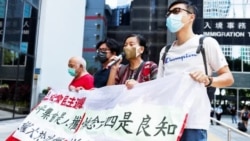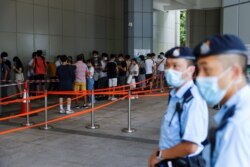On September 15, China’s state-run broadcaster CGTN published an interview with Leung Chun-ying, who served as the third chief executive of Hong Kong between 2012 and 2017.
The interviewer, Dong Hue, said “violent unrest has raped Hong Kong in recent years.” She then asked whether the introduction of the new National Security Law (NSL) and the emphasis on “the principle of patriots governing Hong Kong” had helped the situation.
Leung said he “believed those measures would work.”
"All countries in the world require people who from their political class, the ruling echelon, to be patriots,’ Leung said. “We hear the word patriot, patriotism, patriotic, on the tips of American tongues every day, so Hong Kong should not be any exception.”
But democratic states have nothing like Hong Kong’s NSL or electoral reform law, which created a candidate qualification review committee to vet who can run for office.
Under this system, the Chinese Communist Party (CCP) determines who is “patriotic,” not the electorate. What’s more, senior Chinese officials have admitted that their definition of patriotism entails love for China’s current political system, rather than for country.
The NSL was passed on June 30, 2020, in response to the 2019–2020 Hong Kong pro-democracy protests. Those demonstrations were sparked by a since-shelved extradition bill proposed by the Hong Kong authorities. The bill would have allowed for Hong Kongers to be prosecuted by courts in mainland China.
At their height, the protests, fueled by discontent over Beijing’s encroachment on Hong Kong’s independence, drew an estimated quarter of Hong Kong’s 7.5 million people to the streets. Clashes became increasingly violent, with demonstrators throwing Molotov cocktails and police using live ammunition.
The NSL was intended, in part, to quell that unrest.
The law criminalizes four types of activities – secession, subversion of state power, terrorism and collusion with foreign entities. The law also gives authorities in Hong Kong and Beijing sweeping powers to control the internet, media outlets, schools and other civil organizations.
On September 14, Hong Kong’s security chief Chris Tan announced that new legislation expanding the list of national security offenses would be introduced.
The legislation will cover “espionage activities, the theft of state secrets, activities of foreign political institutions in Hong Kong, and political ties between Hong Kong institutions and foreign countries, among other things,” Tan said, according to Radio Free Asia, a sister organization of VOA.
Critics say the NSL’s “catch-all wording” empowers authorities to criminalize political views.
For example, Hong Kongers face jail time for having or displaying banners, flags or other printed materials that promote Hong Kong’s independence. Chanting similar slogans is also outlawed.
Just this week, the law was used to compel a Tiananmen Square vigil group, commemorating the June 4, 1989, massacre of demonstrators in Beijing, to remove all “online platform information.”
According to the Hong Kong Free Press, the group said it was forced to scrub its online presence based on Article 43 of the NSL.
A study by the Georgetown Center for Asian Law said the "vast majority” of those arrested from July 1, 2020, to January 14, 2021, “would not be considered national security cases in other liberal constitutional jurisdictions.”
Regarding Leung’s “patriotism” assertion, another measure, the "Decision on Improving the Electoral System of the Hong Kong Special Administrative Region," laid the groundwork for overhauling Hong Kong’s political system.
Article one of measure claims improving Hong Kong’s legislative system “must fully and faithfully implement the policy of ‘one country, two systems’,” as well as uphold its constitutional order under both the Chinese constitution and Hong Kong’s basic law (often described as Hong Kong’s mini-constitution).
The decision is also intended to “ensure the administration of Hong Kong by Hong Kong people with patriots as the main body.”
In November 2020, a senior CCP official said the governance of Hong Kong by people “who are patriotic and love Hong Kong” had become a new legal norm.
Also that month, new laws were enacted to disqualify from Hong Kong’s Legislative Council any elected member who “support[s] Hong Kong’s independence, refuses to acknowledge China’s sovereignty over the city, threatens national security, or asks external forces to interfere in the city’s affairs,” The Associated Press reported.
According to National Public Radio, the measure effectively gave Beijing veto power “over who sits in Hong Kong's legislature.”
That prompted mass resignations of pro-democracy lawmakers, essentially leaving the legislative body without an opposition for the first time.
In May, pro-Beijing legislators on the council passed a sweeping electoral reform law, which cut the number of directly-elected representatives and introduced a system to vet candidates.
That law established a Candidate Eligibility Review Mechanism, under which a review committee is “responsible for assessing and validating the eligibility of candidates for the Election Committee Members, the Chief Executive, and the LegCo (legislative council) members.”
In July, Hong Kong Chief Executive Carrie Lam appointed seven members to serve on that review committee.
Lam has likewise stressed the need for electoral reform in Hong Kong so that “patriots” could rule the city-state.
As a part of that review process, Hong Kong’s National Security Department of the Police and the Committee for Safeguarding National Security will determine whether candidates are legally eligible to run for office, basing that decision, in part, on whether the candidates comply with the legal requirements and conditions for upholding the Basic Law and “bear allegiance” to Hong Kong.
Critics say only candidates sufficiently loyal to the Chinese Communist Party will be allowed to run for office, with public opinion having little bearing on a politician’s success.
This bears no resemblance to how voters in the United States, for example, use their personal interpretations of patriotism to assess political candidates.
Scholars have noted that China’s sense of patriotism – or love of country – is really just a form of “party-centric nationalism.”
When the electoral reforms were first proposed in March, Song Ru’an, the Deputy Commissioner of China’s Ministry of Foreign Affairs in Hong Kong, told reporters loyalty to the CCP was part and parcel of officials’ understanding of patriotism.
“When we talk about patriotism, we are not talking about the abstraction of loving a cultural or historical China, but rather loving the currently existing People’s Republic of China under the leadership of the Chinese Communist Party,” the Hong Kong Free Press cited Song as saying.







